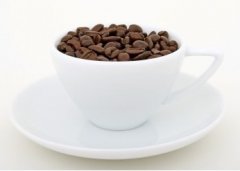The main ingredients of coffee basic knowledge of fine coffee

Caffeine: has a particularly strong bitter taste and stimulates the central nervous system, heart and respiratory system. Moderate caffeine can also reduce muscle fatigue and promote digestive secretion. Because it promotes kidney function, it has a diuretic effect and helps the body expel excess sodium ions from the body. Too much caffeine can lead to caffeine poisoning.
Tannin: Boiled tannins break down into pyrochloric acid, so coffee brewed too long will taste worse.
Fats: The most important of these are acidic fats and volatile fats. Acidic fat: That is, fat contains acid, its strength will vary depending on the type of coffee. Volatile fat: the main source of coffee aroma, it is a kind of will emit about forty aromatic substances.
Protein: A major source of calories, but not a high percentage. Coffee powder protein in brewing coffee, most will not dissolve out, so intake is limited.
Sugar: Coffee beans contain about 8% sugar, most of which will be converted into caramel after roasting, making coffee brown and sweet with tannins.
Fiber: The fibers of the raw beans are carbonized after roasting and combine with caramel to form the hue of coffee.
Minerals: contains a small amount of lime, iron, phosphorus, sodium carbonate and so on.
Important Notice :
前街咖啡 FrontStreet Coffee has moved to new addredd:
FrontStreet Coffee Address: 315,Donghua East Road,GuangZhou
Tel:020 38364473
- Prev

Autumn diet guide: soybean milk plus coffee nutrition and weight loss
After a long and hot summer, the body consumes more energy and eats less, so in the autumn when the temperature is getting lower, it is necessary to replenish the body and store energy for the cold winter. People often ignore the requirements of their daily diet because of their fast-paced life, and many people are satisfied with simply having enough to eat, ignoring the reasonable collocation of nutrition. One fast food, one bottle of pure water,
- Next

Yunnan small grain coffee grows on a mountain with an altitude of 800 to 1800 meters above sea level.
Nowadays, most people choose foreign coffee to drink coffee, but you may not know that there are also high-quality coffee producing areas in China, such as Yunnan small-grain coffee. I believe you will fall in love with Yunnan small-grain coffee. Small-grain coffee is suitable for growing in the mountains at an altitude of 800 to 1800 meters. If the altitude is too high, it will taste sour, and if it is too low, it will taste bitter. So most of the small grains of coffee are planted at 11 above sea level.
Related
- Detailed explanation of Jadeite planting Land in Panamanian Jadeite Manor introduction to the grading system of Jadeite competitive bidding, Red bid, Green bid and Rose Summer
- Story of Coffee planting in Brenka region of Costa Rica Stonehenge Manor anaerobic heavy honey treatment of flavor mouth
- What's on the barrel of Blue Mountain Coffee beans?
- Can American coffee also pull flowers? How to use hot American style to pull out a good-looking pattern?
- Can you make a cold extract with coffee beans? What is the right proportion for cold-extracted coffee formula?
- Indonesian PWN Gold Mandrine Coffee Origin Features Flavor How to Chong? Mandolin coffee is American.
- A brief introduction to the flavor characteristics of Brazilian yellow bourbon coffee beans
- What is the effect of different water quality on the flavor of cold-extracted coffee? What kind of water is best for brewing coffee?
- Why do you think of Rose Summer whenever you mention Panamanian coffee?
- Introduction to the characteristics of authentic blue mountain coffee bean producing areas? What is the CIB Coffee Authority in Jamaica?

